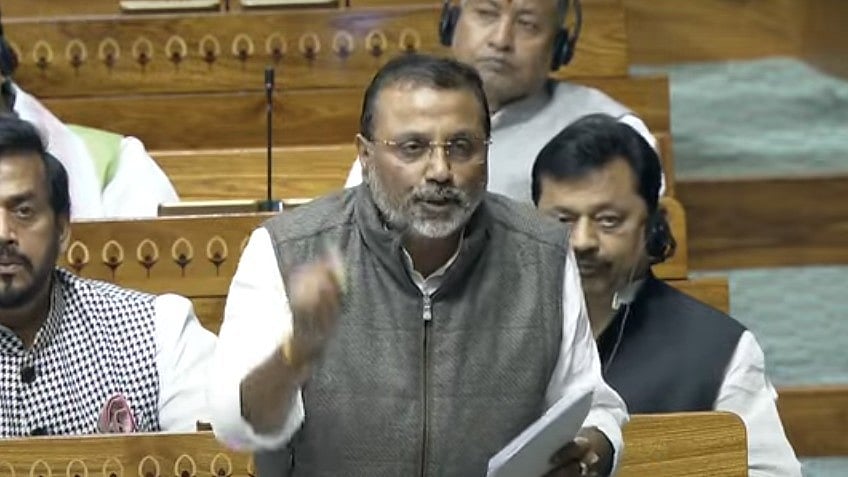
BJP's Nishikant Dubey.
Credit: Sansad TV
New Delhi: A Supreme Court lawyer, representing one of the litigants in the Waqf Act case, has written to Attorney General R Venkatramani seeking consent to initiate contempt proceedings against BJP MP Nishikant Dubey for his "grossly scandalous remarks aimed at lowering the dignity" of the top court.
Advocate Anas Tanwir wrote the letter under Section 15(1)(b) of the Contempt of Courts Act, 1971, read with Rule 3(c) of the Rules to Regulate Proceedings for Contempt of the Supreme Court, 1975, to seek his consent for initiating criminal contempt proceedings against Dubey.
Under the contempt law, it is mandatory to seek consent of the Attorney General before initiating the proceedings.
The BJP MP had claimed the Supreme Court was taking the country towards anarchy.
He said, Article 368 stated that only Parliament has the authority to make laws in this country. The Supreme Court has the right to interpret the law.
"But now the Supreme Court is saying that the President should decide what to do within three months, and the Governor should decide what to do within three months," Dubey said.
The lawyer claimed Dubey made communally polarising remarks that directly cast aspersions on the impartiality of the Supreme Court.
He quoted Dubey stating, "When the issue of the Ram temple arises, you (Supreme Court) say 'show documents; when the issue of Krishna Janmabhoomi comes up in Mathura, you say 'show documents'; when it comes to the Gyanvapi Mosque, again you say show documents. But when it comes to the mosques built after the arrival of the Mughals, you say there are no documents to show."
The lawyer contended the remarks are not only factually incorrect but are also intended to scandalise the Supreme Court, erode public trust, and incite communal distrust in judicial impartiality, all of which clearly fall within the meaning of criminal contempt as defined under Section 2(c)(i) of the Contempt of Courts Act, 1971.
"In addition to the statements, Dubey has reportedly made an even more outrageous and defamatory claim, wherein he states: "Chief Justice of India Sanjiv Khanna is responsible for the civil wars taking place in the country."
"This statement is not only deeply derogatory but also dangerously provocative. It recklessly attributes national unrest to the Chief Justice, thus scandalising the highest judicial office in the country and attempting to provoke public distrust, outrage, and possible unrest. Such an allegation devoid of any basis constitutes a grave attack on the integrity and independence of the judiciary, and is an act deserving of urgent and exemplary legal scrutiny under the Contempt of Courts Act, 1971," the lawyer said.
He claimed, additionally, Dubey's reference to Article 368 is misleading and calculated to portray the judiciary as encroaching upon the powers of the legislature, whereas in reality, the Supreme Court is fully empowered under Articles 141 and 142 to issue binding directions to uphold constitutional mandates.
"By suggesting that the Supreme Court is creating 'anarchy, Dubey has made a deliberate attempt to vilify the institution of the judiciary," he said in his letter.
Days after Vice President Jagdeep Dhankhar’s broadside at the judiciary, Dubey had on April 19 attacked the Supreme Court, saying Parliament and Assemblies should be shut if the apex court is dictating laws and that Chief Justice Sanjiv Khanna is “responsible for civil wars” in the country.
Through a post on ‘X’ and remarks to video news agencies, the four-time MP from Jharkhand also claimed that the Supreme Court was pushing the country towards anarchy, as he questioned the decisions on setting a timeline for the President and Governors for clearing bills and nudging the government not to operationalise certain provisions of the new Waqf law.
The BJP, however, disassociated itself from Dubey’s remarks, with party president J P Nadda rejecting the comments as personal views.
